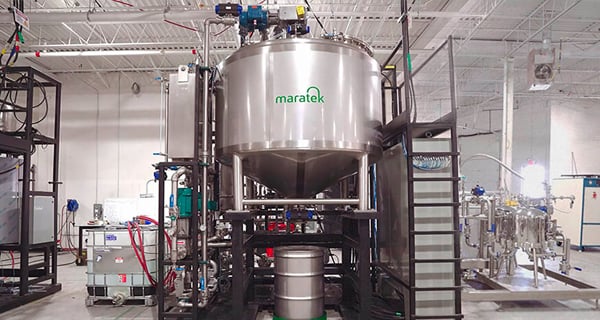Top 3 Benefits of Solvent Recycling
 The expensive costs of solvent purchasing and resulting waste can cause unnecessary expenses that can be easily reduced with a reliable solvent recycling and recovery system.
The expensive costs of solvent purchasing and resulting waste can cause unnecessary expenses that can be easily reduced with a reliable solvent recycling and recovery system.
For a typical printer, for example, one drum of virgin blanket wash used on the press results in about two drums of waste that can cost in excess of $300 to dispose of. By recycling that used blanket wash, you capture nearly all of the solvent to reuse with less than $20 of waste to ship.
This results in a 95 percent reduction of hauling and disposal costs, with less new blanket wash to purchase.
There are many benefits to solvent recycling. Here are our top three:
1 - Economic benefits
The purpose of solvent recycling and recovery is to help facilities accomplish two major goals- minimizing liquid waste disposal expenses and maximizing solvent usage through the recovery of liquid solvent waste such as alcohol waste, blanket wash, and liquid cleaning solvents – providing huge economic benefits.
With recent market trends, the price of solvents has continued to increase making it difficult for businesses to afford. Maratek’s MaraSolve program fixes this issue as it allows you to purchase your own recycled solvent back. Thus, allowing you to cut down on your purchasing costs of solvents. Furthermore, the service of waste disposal and solvent purchasing from Maratek will be reduced from what you’re currently paying.
In addition to MaraSolve, Maratek offers a share the savings program with similar goals to the MaraSolve program. In share the savings program, companies are allowed to rent or lease solvent recycling and recovery equipment with no money down, no risk, and no capital expenses. Share the savings program allows companies to have a trial of some of Maratek’s renowned equipment designed by our brightest engineers to help reduce their expenses. What are you waiting for? Let's share the savings.
Based upon our experience with over 250 installed solvent saver systems, the equipment typically pays for itself in less than 12-18 months!
2 - Environment benefits
Solvent recycling serves many benefits as its only purpose is just not to reduce solvent purchasing. Solvent recycling also offers companies to reduce their ecological footprint through minimizing waste disposal, virgin chemical purchases, and chemical storage.
When you’re finished with a solvent, it is categorized as a hazardous waste. Hazardous waste is harmful for the environment because of its difficulty of disposal as well as its toxic elements. Through recycling solvents, companies minimize the need for disposal as well as cut down on virgin solvents inventory.
With less inventory, companies are not only able to save money on storage but are minimizing the amount of harmful toxins that are released into the earth. In addition, recycling solvents reduces the impact solvents have on surrounding communities through the reduction of emissions and hazardous waste landfills.
3 - Regulatory compliance
In Canada, the handling and disposal of hazardous waste is heavily legislated. The main reasons for this are to encourage environment protection and abide by Canadian residents' rights. The three levels of government involving municipality, provincial, and legislative are all involved in the process of hazardous waste legislation.
The objective of hazardous waste legislation is to regulate the process and amount of hazardous waste being disposed of in the environment. This regulation is important as it helps maintain a healthy state of the environment and protect human health.
These regulations include strict laws in each level of government with heavy fines attached to them to incentivize citizens to abide by these laws. Implementing a recycling and recovery program will reduce your production of hazardous waste while showing your support of green initiatives.
How does solvent recycling and recovery work?
When using Maratek’s effective solvent recycling equipment, contaminated solvents, or mixtures of chemical substances, are heated through the use of heat transfer media (thermal oil, hot water, steam) and are brought to a boiling point. The gases resulting from this distillation process are then liquefied and cooled by condensation in the cooler.
When it comes to sensitive chemical materials, thermal decomposition can happen during distillation. In order to prevent this, and also in order to reduce energy consumption (and with this decreasing operating costs), the gentle process of vacuum distillation is used which is performed at low pressure (vacuum).
Due to the vacuum, the boiling point of the liquids that are to be separated is reduced as well as the possibility of foaming, is significantly reduced and the components evaporate at a much lower temperature than at normal pressure.
Interested in learning more about solvent recycling and recovery? Contact us today!





